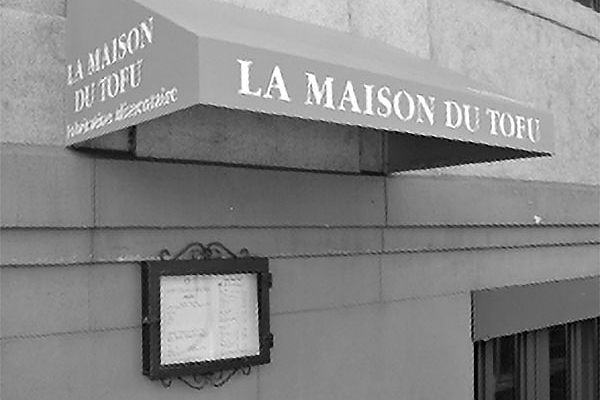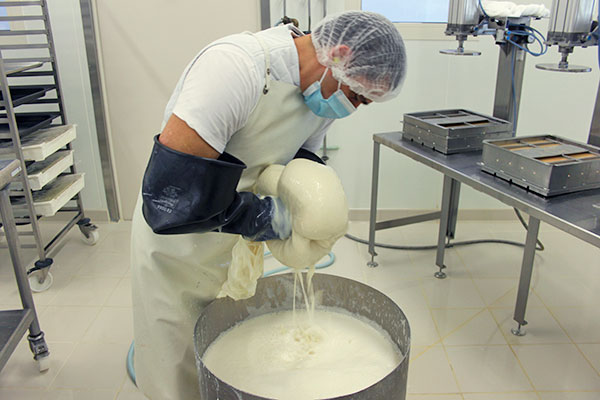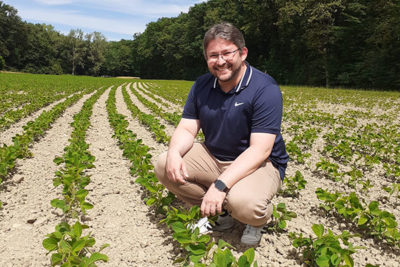Soy-based products may be common in Switzerland today, but this wasn’t always the case.
In 1977, the company Swissoja was conceived by a visionary who fell in love with tofu and its extraordinary nutritional properties. He embarked on a mission to introduce Switzerland to soy’s endless possibilities, leading to Swissoja’s range of products today, including 100% Swiss-made organic tofu, soy drinks, burgers, and more.

Join us for a conversation with Aurélia Studer, the Marketing Manager of Swissoja. She spoke with us about the challenges of operating a Swiss soy company committed to local production, discusses the company’s underlying philosophy, and imparts valuable insights for aspiring entrepreneurs embarking on ventures with purpose.
Swissoja was founded in 1977, at a time when Swiss people did not commonly consume soy-based products like tofu or drinks. What inspired you to start this business?
After a trip to Asia, our founder, won over by tofu and its exceptional nutritional values, decided to create his own company, initially called La Maison du Tofu, to promote this product in Europe.

He wanted to commit himself to a healthy diet, respectful of the environment and of people. This revolutionary philosophy at the time has endured and has since become part of Swissoja’s mission.
Throughout Swissoja’s journey until today, what has been the most challenging aspect?
We have been present in the catering industry for many years (hospitals, schools, wholesalers, company restaurants, etc.). On the other hand, our biggest challenge is to be known and recognized by the mass-market retailers so that they can give us a place on their shelves. So, we can promote our local know-how and conquer the hearts of the general public.
We want to have a positive impact on society and the environment by using only organic and local soybeans, by minimizing the processing of our raw materials without adding preservatives or flavor enhancers to present consumers with a finished product of the highest possible quality.
Indeed, this lack of notoriety is also verified at the time of raising the funds necessary to finance our growth because, if you are not distributed on a national scale, it is difficult to be supported by potential financial partners.
Could you elaborate on the underlying philosophy behind your products and the mission of your company?
We want to have a positive impact on society and the environment by using only organic and local soybeans, by minimizing the processing of our raw materials without adding preservatives or flavor enhancers to present consumers with a finished product of the highest possible quality.
Our mission is to “create and promote healthy food based on organic Swiss soy”.

In addition to the health aspect, we are constantly working to improve our ecological footprint through numerous projects such as waste reduction and recycling, as well as energy efficiency. Sustainability is our top priority.
In what ways do you believe Swissoja’s mission aligns with the pressing need for a more sustainable economy and future?
First, our choice to promote 100% plant-based food allows us to have a positive influence on the primary cause of greenhouse gases: food consumption. By offering consumers an alternative source of quality protein, we are giving them the opportunity to be an agent of change and to act directly on the problem of global warming.
For us, it’s important to take care of these resources and contribute to their development, because we believe it’s the right thing to do now and for future generations, without expecting any immediate monetary return.
Then, by using only organic and Swiss soybeans, as well as local know-how, we are promoting short circuits and reducing the creation of C02 linked to transport. We’re highlighting the work of our farmers and helping to promote the local economy.

What advice would you offer to young businesses aspiring to make a meaningful impact?
Our advice is to first define a clear strategy to determine on which social issue they want to have an impact, and how. Then, to evaluate the current situation and set up a system to measure the impact of their actions.
And finally, we recommend challenging oneself to go ever further, finding new measures and not being satisfied with the status quo, with a view to constantly increasing the added value created for society and the environment.

How do you personally define “wealth beyond money”? What does this concept mean to you?
These are the aspects of society that contribute to well-being and on which we cannot put an economic value, such as biodiversity or human relations, but which bring great wealth to all.
For us, it’s important to take care of these resources and contribute to their development, because we believe it’s the right thing to do now and for future generations, without expecting any immediate monetary return.
Thank you, Aurélia!
Visit Swissoja’s website and find out more about its history and products. And if you want to learn about the impact of your diet on your carbon footprint, we recommend our article “Sustainable food: A guide for seasonal and regional food shopping”.




